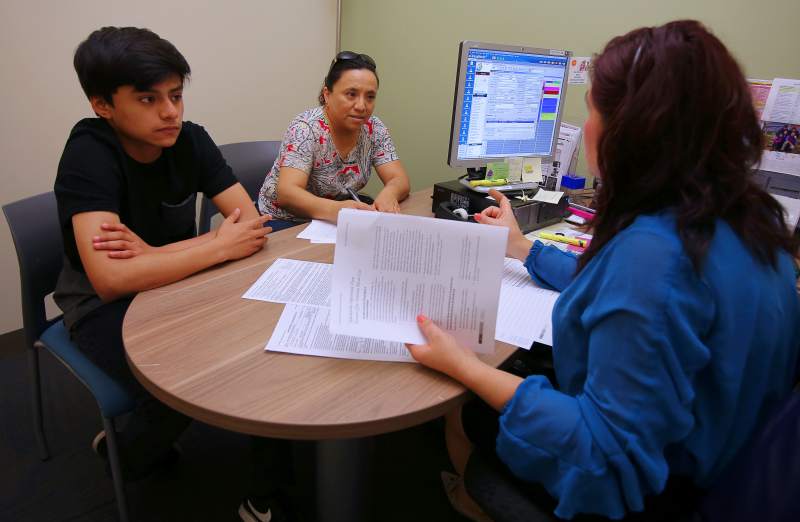SONOMA, CA| by Alexandria Bordas | March 26, 2019
Original article can be found at: https://www.pressdemocrat.com

For years leading up to now, state and local health officials have struggled to fill what they described as a clear gap in California’s publicly funded health care coverage. Adults who came to the state as undocumented immigrants were not getting medical care they urgently needed, providers said.
Many remained too scared to make appointments or otherwise seek out basic primary care, health officials said. And not enough was being done to reach such families and reassure them that their immigration status was not an issue when it came to medical treatment, providers said.
With up to 2.6 million undocumented immigrants in the state — a quarter of the overall estimated tally in the U.S. — the shortfall was both widespread and an acute concern for officials in more than a dozen rural counties, including Sonoma.
But a new effort begun this year aims improve health outreach and services for undocumented adults in those counties. It enrolled more than 600 patients in its first few weeks, and many have shared their relief in finally having a place to go for their medical care, said Kari Brownstein, administrative officer for the Sacramento-based County Medical Services Program, a 35-county entity that oversees the new initiative.
“We started this program at the urging of our clinics and advocates, so it is because of them that we created this,” Brownstein said. The program targets adults age 21 to 64.
“It is a need that is very much out there.”
Beyond California’s Medi-Cal coverage for undocumented children, and emergency and pregnancy-related services, primary care coverage has remained limited for undocumented adults.
The Path to Health project, which officially launched on Tuesday, aims to expand the medical care available to those residents, offering a new range of basic and ongoing preventative services.
The barriers to that type of care have long impacted low-income and undocumented families in Sonoma County, said Pedro Toledo of Petaluma Health Center, one of two Sonoma County clinics involved in the program. Santa Rosa Community Health Centers is the other network involved. Clinics in Napa and Mendocino counties also are participating.
“Many of our undocumented patients tend to be younger, working class people that work multiple jobs to maintain a family,” said Toledo, chief administrative officer at Petaluma Health Center. “They often neglect their health because they work so much and do not pay attention to their conditions until it is too late.”
Patients eligible under the new program will have access to primary care doctors at the clinics, including specialists, and will be able to schedule to physicals, immunizations, lab tests and cancer screenings, as well as procure drug prescriptions starting at a $5 copay, according to the program description.
Those wishing to enroll must already be covered under the state’s emergency Medi-Cal plan. With proof off that coverage, participating clinics can enroll patients in the new program in as little as 10 minutes, Toledo said. Afterward, they can immediately start seeking services, he said.
“We enrolled nearly 200 people in the two weeks before the official launch,” said Eliot Enriquez, program and outreach manager at Petaluma Health Center. “I am loving it because I am a product of a similar program and I grew up visiting centers like this for all my health needs. So I know from direct experience the importance of programs like Path to Health.”
The program is managed through CMSP, the coalition of rural counties, and is an expansion of their existing healthcare initiatives to provide coverage to low-income, uninsured adults, Brownstein said. Clinics bill CMSP for any services provided to undocumented patients enrolled in Path to Health, she said.
“This gives people more legitimacy to take care of themselves and is a huge relief for people who have not sought care due to fear of being undocumented in this climate,” Brownstein said.
Annemarie Brown said at the clinics operated by Santa Rosa Community Health Centers they have so far enrolled 60 people.
A lot of patients her team comes into contact with are undocumented and not eligible for the full scope of care, said Brown, the director of program communications and grants development.
The pilot program ends in 2021, but Brownstein said she hoped that the CMSP governing board may expand it beyond that date.
“From a social justice perspective we believe everyone deserves outstanding care no matter who you are or what is going on,” Brown said. “Imagine being sick with a chronic disease and being unable to afford medications or be able to see a doctor. This is a huge stress reliever.”
You can reach Staff Writer Alexandria Bordas at 707-521-5337 or alexandria.bordas@pressdemocrat.com. On Twitter @CrossingBordas.
Share this Post












